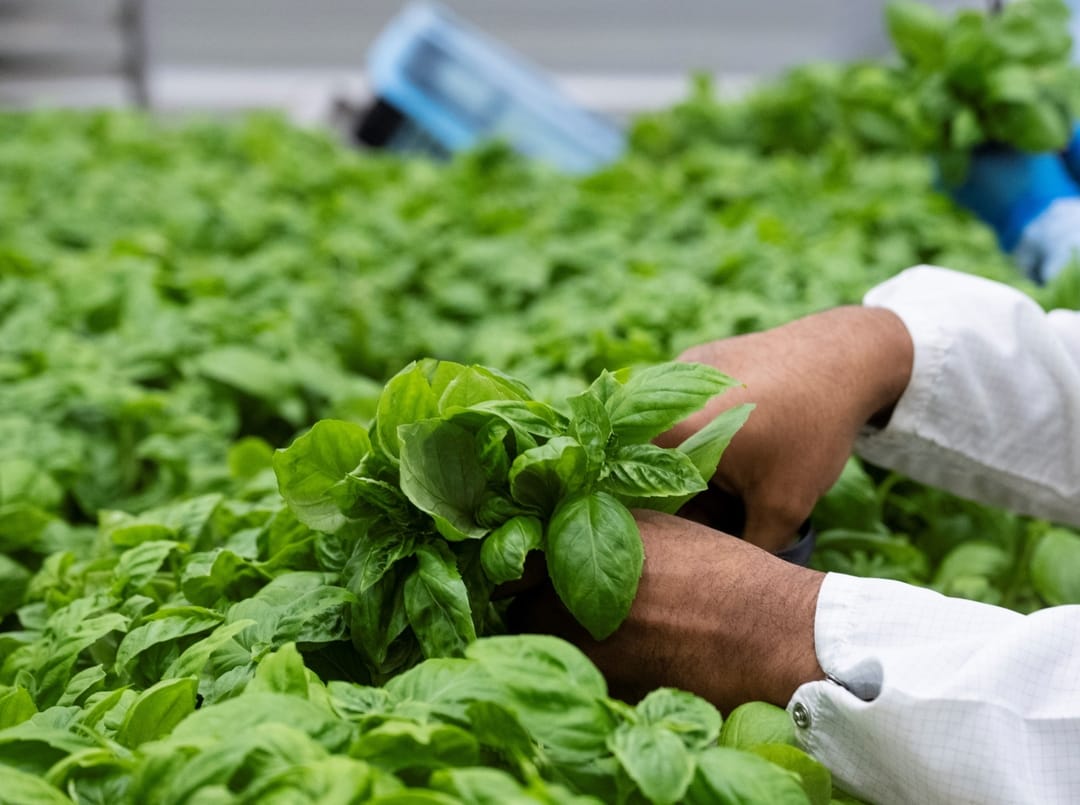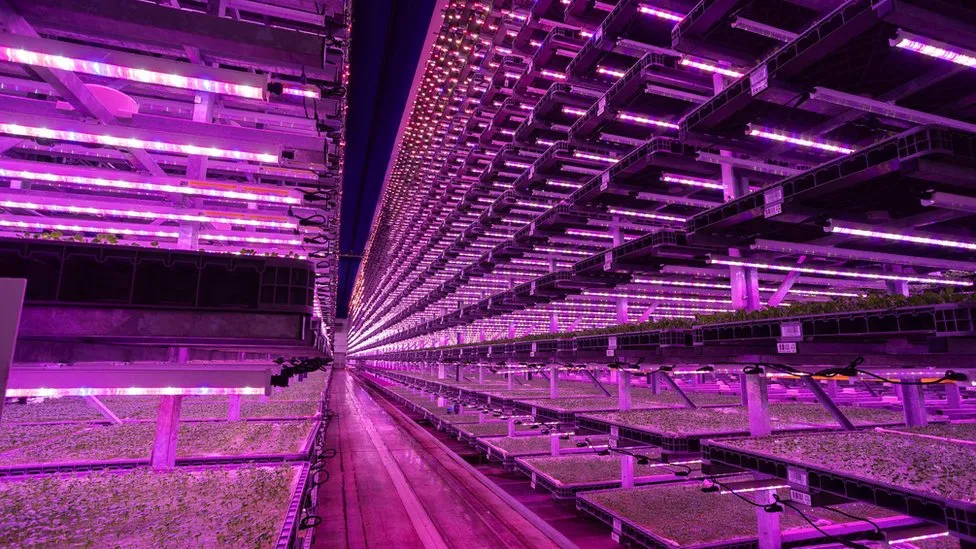Gloucestershire welcomes a cutting-edge vertical farm among the UK’s most technologically advanced.
Jones Food Company (JFC) has opened a new vertical indoor farm with the most advanced technology in Gloucestershire. This innovative indoor farm boasts a controlled environment, enabling salad growth three times the speed of traditional outdoor agriculture. Special lights and a warm, humid atmosphere nurture the cultivation of lettuce, basil, and other herbs.
An article published by BBC shows that the high-tech facility resembles a warehouse rather than a traditional farm, with neatly arranged rows of trays. Each tray is abundant with various plants, illuminated by vibrant, multi-coloured lights.
There are about fifteen rows stacked one above the other, climbing to the roof of the vast building – hence the reason it is called vertical farming. In all, there are 14,500 square metres of growing space. Also, the air is kept at 27 degrees and around 75% humidity.
According to Glyn Stephens, the head grower at Jones Food Company, the plants thrive in the farm’s controlled atmosphere. Basil, for instance, goes from seed to harvest in just 18 days, a pace approximately three times faster than in outdoor conditions. When mentioning “outdoors,” he refers to locations such as Spain or Morocco during this time of the year.
Year-round, British supermarkets offer bags of salad leaves for sale. However, during the winter, these salads need to be imported.

Jones Food Company’s Vertical Farming
With the global population projected to reach 10 billion by 2050 and climate change depleting crucial resources, producing more food with fewer environmental impacts is paramount. In response to this challenge, JFC’s groundbreaking vertical farming strategy emerges as a promising solution.
Through Controlled Environment Agriculture (CEA), this innovative approach enables cultivating substantial quantities of nutritious, locally sourced food year-round. By adopting such sustainable practices, JFC addresses the pressing need for efficient and environmentally conscious food production in the face of a growing global population and changing climate conditions.
According to the company’s website, by stacking crops on vertical layers, growing crops 24/7, 365 days a year and utilising proprietary growing methods and software, they can improve yields and commercial viability.
Moreover, JFC goes beyond traditional farming with space-efficient vertical farms optimised for automation. Their world-class facilities feature state-of-the-art robotic systems and cutting-edge technology from The Ocado Group, allowing them to deliver consistent, high-quality produce with minimal waste.
Apart from that, JFC’s vertical farms compete effectively with traditional indoor hydroponic greenhouses, offering a viable solution for meeting the growing demand for affordable, high-quality fresh produce.

Jones Food Company’s Effort for Sustainability & Efficiency
Mr Stephens emphasises that his crops produce significantly lower carbon emissions than imports. He clarified, “When you consider transporting crops across Europe or air-freighting them, our carbon savings are substantial.”
The farm consumes substantial power, primarily for the scientifically-calibrated LED lights designed to stimulate growth. In addition, there’s significant usage for ventilation, water circulation, and numerous climate control systems. All the energy is derived from renewable sources and meticulously managed.
Moreover, farms of this nature are shielded from weather-related challenges, avoiding issues like floods and droughts. The tightly controlled bio-security measures in the growing shed prevent most pests from infiltrating. However, the reliance on substantial electricity consumption has posed challenges for other vertical farms.
James Lloyd-Jones, the Jones Food Company’s founder, boasts their new Gloucestershire farm is not just efficient but also “cracks the code” for sustainable year-round food production. They achieve this by fine-tuning climate control for minimal energy use while maintaining competitive prices like their £1.25 salad bags.
Future of Farming
Vertical farming is the future of agriculture. This type of farming yields various benefits that surpass conventional farming. Innovation is critical to sustainable food production; JFC’s innovative vertical farms demonstrate the potential of technology to address challenges in the food industry. JFC’s ability to compete with traditional farms while maintaining affordability and quality is crucial to its success and the future.
Learn more about Jones Food Company on their official website.


